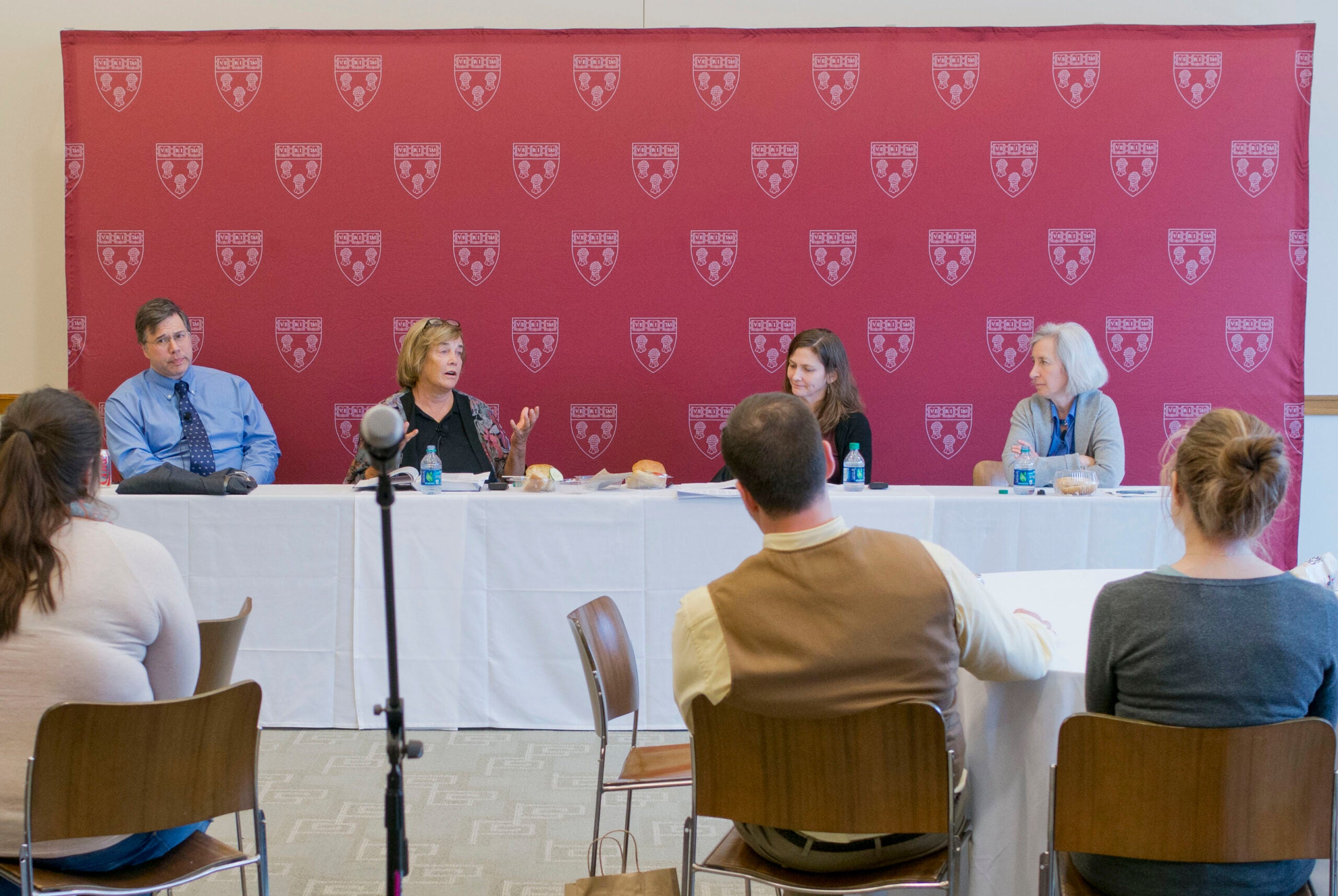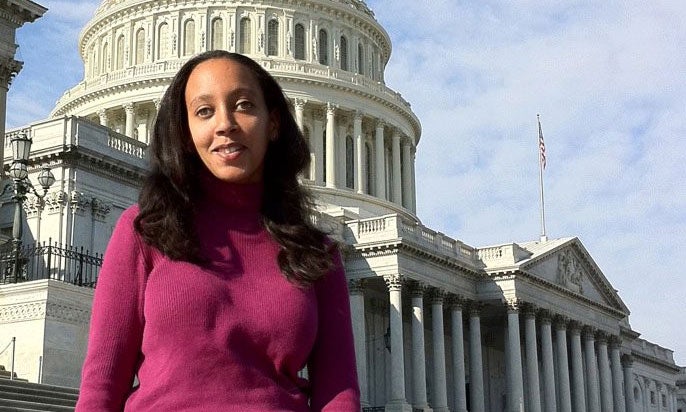President Obama types a message to Haben Girma, who is deaf and blind, before she introduced him at ADA reception pic.twitter.com/YsUKEsvWva
— petesouza (@petesouza) July 21, 2015
This month marks the 25th anniversary of the Americans with Disabilities Act. President George H.W. Bush signed the ADA on July 26, 1990, committing the nation to eliminating discrimination against people with disabilities. A special reception was held at the White House on July 20 to celebrate the landmark act.
On hand to introduce President Barack Obama ’91 and Vice President Joe Biden was Harvard Law School graduate Haben Girma ’13, who is currently a Skadden Fellow at Disability Rights Advocates in Berkeley, Calif. Girma was the first deafblind student to graduate from HLS. While studying at the law school, she was named a White House Champion of Change for her advocacy on behalf of deafblind individuals and her efforts in promoting educational excellence for African Americans. Read more about her journey to HLS and career as an advocate.
“For my grandmother back in Africa, my success in law school seemed like magic,” said Girma in her introduction. “For all of us here, we know people with disabilities succeed not by magic, but through opportunities in America, and the hard won power of the ADA.”
Click here for a full transcript of Haben Girma’s introduction and President Obama’s remarks.
“It was very moving, indeed, to see Haben Girma introduce President Obama—two extraordinary graduates,” said Professor William Alford ’77, who was also in attendance, accompanying a dozen Special Olympics athletes. Alford has been on the board of directors of Special Olympics International for ten years and has been active in the organization for several decades.
He was also representing the Harvard Law School Project on Disability (HPOD), where he is the chair. When Girma was a student at HLS, HPOD “sent her to China where she was a great hit and an inspiration to students both with and without a disability,” said Alford, who is also the vice dean for the Graduate Program and International Legal Studies and director of East Asian Legal Studies at Harvard Law School.
In 2007, in his role as chair of HPOD with Visiting Professor and HPOD Executive Director Michael Stein ’88, Alford organized the People’s Republic of China’s first conference on disability law, in conjunction with Renmin University of China and the China Disabled Persons’ Federation.
HLS panel marks the 25th Anniversary of the Americans with Disabilities Act

In April, Harvard Law School commemorated the anniversary of the landmark legislation with a panel discussion on the impact of the ADA on higher education.
The event, co-sponsored by the Dean of Students Office, Advocates for Inclusion, Student Mental Health Association, Students for Inclusion, and Supero, featured three experts on disability law and rights: Professor Michael Stein ’88 co-founder of the Harvard Law School Project on Disability with Professor William Alford ’77; Professor Martha A. Field, who teaches a seminar on disability and law, and is the co-author of “Equal Treatment for People with Mental Retardation;” and Visiting Professor Elizabeth Emens, a professor at Columbia Law School who specializes in anti-discrimination law.
Dean Martha Minow kicked off the event by asking panelists what changes they have observed since the adoption of the ADA.
Stein, who has been in a wheelchair since he was a teenager, said he believes there has been a “180-change” in attitudes about students with disabilities attending Harvard Law School.
He said when he was a 1L at HLS, there were no accommodations for disabilities. The only dorm room that had a ramp didn’t have modifications to the room or bathroom, and, with no elevators to the Hark, tunnels or Law Review, Stein was forced to drag himself up and downstairs. At the time, he said, the prevailing attitude was, ‘If you don’t like it, you could go to Yale.’
Twenty years later, Stein said, his students are incredulous at what he had to endure. He said he is struck by the differences in accessibility and inclusion, but more importantly in the attitudes and expectations of students, all of whom grew up under the legal protections of the ADA. “In 20 years, to have this complete change in expectations and legal landscape, but more so in the culture,” he said, “speaks to the success of the ADA.”
Field, who joined the faculty as a tenured professor in 1979, also cited the progress that has been made in the availability of resources, including the Project on Disability, and in creating a spirit of inclusiveness.
“The obvious change at the law school is that we’ve become so much more inclusive, in many ways, but especially with disability,” said Field, who recalled serving on an admissions committee with a faculty member who recommended denying a student admission because he believed a blind student couldn’t be a lawyer.
But, said Field, progress has been hampered by the Supreme Court, which has taken out a lot of protections that were intended in the ADA. “It surprises me, in the past 20 years, that the gay rights movement has gotten so much further than the disability rights movement,” said Field. “A lot of that is the function of the courts.”
Emens said there has been a flourishing of ideas around disability in higher education, including a robust critique of the social model and a pushing on its limits. But, she added, “We’re still so much in a compliance model in relation to disability, in contrast to how we think about our other categories of discrimination.”
